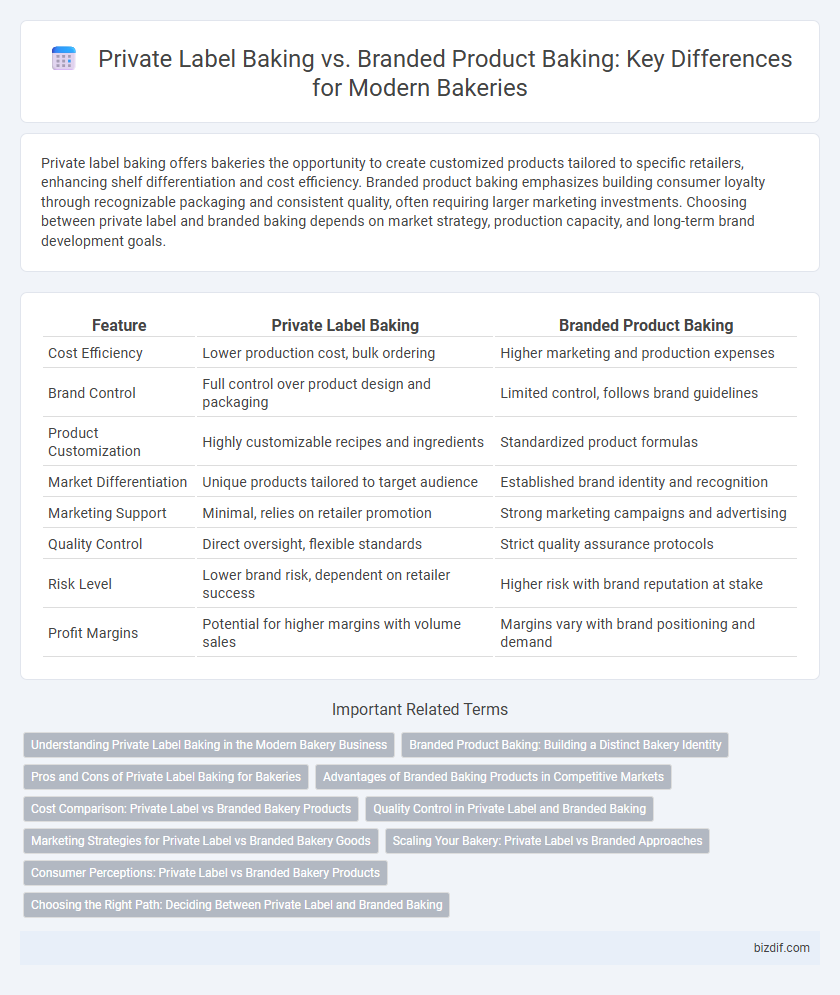Private label baking offers bakeries the opportunity to create customized products tailored to specific retailers, enhancing shelf differentiation and cost efficiency. Branded product baking emphasizes building consumer loyalty through recognizable packaging and consistent quality, often requiring larger marketing investments. Choosing between private label and branded baking depends on market strategy, production capacity, and long-term brand development goals.
Table of Comparison
| Feature | Private Label Baking | Branded Product Baking |
|---|---|---|
| Cost Efficiency | Lower production cost, bulk ordering | Higher marketing and production expenses |
| Brand Control | Full control over product design and packaging | Limited control, follows brand guidelines |
| Product Customization | Highly customizable recipes and ingredients | Standardized product formulas |
| Market Differentiation | Unique products tailored to target audience | Established brand identity and recognition |
| Marketing Support | Minimal, relies on retailer promotion | Strong marketing campaigns and advertising |
| Quality Control | Direct oversight, flexible standards | Strict quality assurance protocols |
| Risk Level | Lower brand risk, dependent on retailer success | Higher risk with brand reputation at stake |
| Profit Margins | Potential for higher margins with volume sales | Margins vary with brand positioning and demand |
Understanding Private Label Baking in the Modern Bakery Business
Private label baking allows bakeries to produce customized baked goods sold under a retailer's own brand, offering greater flexibility in product design and packaging. This approach reduces marketing costs and builds retailer loyalty by providing exclusive recipes tailored to specific market demands. Understanding private label baking is essential for modern bakery businesses to capitalize on niche markets and enhance profit margins through strategic partnerships with retailers.
Branded Product Baking: Building a Distinct Bakery Identity
Branded product baking emphasizes creating unique recipes and packaging that reflect the bakery's core values and craftsmanship, fostering strong customer loyalty and market differentiation. Investing in quality ingredients and innovative flavors enhances brand recognition and positions the bakery as a premium choice in a competitive industry. Consistent branding across products and marketing channels strengthens consumer trust and drives repeat business through a distinct bakery identity.
Pros and Cons of Private Label Baking for Bakeries
Private label baking allows bakeries to produce customized products that enhance brand identity and foster closer customer relationships while reducing marketing costs. However, it may require higher initial investment in packaging and design, coupled with potential challenges in scaling production to meet varying demands. Limited brand recognition compared to established branded products can also impact consumer trust and sales volume.
Advantages of Branded Baking Products in Competitive Markets
Branded baking products offer consistent quality and build strong consumer trust, which drives repeat purchases and brand loyalty in competitive bakery markets. Their established reputation allows for premium pricing and effective marketing strategies that differentiate them from private label options. Strong brand recognition also enhances distribution opportunities in retail networks, ensuring wider market reach and sustained sales growth.
Cost Comparison: Private Label vs Branded Bakery Products
Private label baking offers significantly lower production and marketing costs compared to branded bakery products, resulting in more competitive pricing for retailers and consumers. Branded products incur higher expenses due to brand development, advertising, and distribution channels, which increase their retail price. Retailers often prefer private label bakery items to maximize profit margins while maintaining quality standards.
Quality Control in Private Label and Branded Baking
Quality control in private label baking focuses heavily on meeting retailer-specific standards, ensuring consistency, ingredient traceability, and regulatory compliance tailored to client requirements. Branded product baking emphasizes maintaining brand reputation through rigorous quality assurance protocols, ingredient sourcing scrutiny, and consumer safety measures. Both approaches invest in advanced testing technologies and standardized production processes to deliver high-quality baked goods.
Marketing Strategies for Private Label vs Branded Bakery Goods
Private label baking leverages cost-effective marketing strategies by focusing on retailer partnerships and in-store promotions, enabling competitive pricing and targeted customer reach. Branded bakery products invest heavily in brand identity, mass media advertising, and emotional storytelling to build customer loyalty and justify premium pricing. Data-driven marketing analytics guide private labels to optimize shelf placement and tailor local campaigns, whereas branded products emphasize nationwide campaigns and influencer collaborations.
Scaling Your Bakery: Private Label vs Branded Approaches
Scaling your bakery through private label baking allows for flexibility and lower marketing costs by producing goods for other brands, maximizing production capacity and profit margins. Branded product baking, on the other hand, builds customer loyalty and brand recognition, driving direct sales but requiring higher investment in marketing and brand development. Evaluating market demand, production capabilities, and long-term growth goals determines whether private label or branded approaches best expand your bakery's reach and revenue.
Consumer Perceptions: Private Label vs Branded Bakery Products
Consumer perceptions of private label bakery products have evolved, with many viewing them as high-quality, cost-effective alternatives to branded bakery goods. Studies show that private label items often attract price-sensitive customers who do not want to sacrifice taste or freshness. Branded bakery products continue to appeal to consumers seeking brand assurance, innovation, and premium ingredients.
Choosing the Right Path: Deciding Between Private Label and Branded Baking
Choosing between private label baking and branded product baking requires analyzing target market preferences, production costs, and brand control. Private label baking offers cost-efficiency and customization for retailers, while branded baking emphasizes brand recognition and customer loyalty. Evaluating factors like market positioning, supply chain capabilities, and long-term growth potential guides the optimal strategy.
Private Label Baking vs Branded Product Baking Infographic

 bizdif.com
bizdif.com